Fathers and Sons:
The Next Generation of Indian Classical Musicians
[dropcap]F[/dropcap]athers leave children an inheritance of whatever they’ve acquired during their lifetime. But how is a musical legacy passed on? For fans of these master musicians, there is good news – the children of some legendary musicians are carrying on the legacy of their musical riches.
We talk to these emerging sons of famous fathers. What is it like to grow up in the home of a famous maestro like Ustad Vilayat Khan or Pandit Hari Prasad Chaurasia? What is it like to be the son of Ustad Sultan Khan or Shiv Kumar Sharma?
In this post, Rakesh Chaurasia talks about his famous ‘babuji’ and how he transformed his life. He says with heartfelt conviction: “I’ve not seen Krishna or heard the magic of his flute. So for me Hariji is Krishna.”
[dropcap]T[/dropcap]hese young artistes were seen in the Music Festival of India series presented y SAMAA. There are Sabir Khan & Hidayat Khan in Jugalbandi of Sarangi & Sitar and Rakesh Chaurasia & Rahul Sharma in Jugalbandi of Bansuri & Santoor.
So who are these artistes? For those who have not heard them before, here is the musical equivalent of Cliff notes or the 30-second bios on their accomplishments: Rakesh Chaurasia, nephew of Pandit Hari Prasad Chaurasia, is winner of ‘Surmani’ and an accomplished flute player. He has performed in music festivals all over the world and has a successful album ‘Via’ with Talvin Singh. He was part of 24 hour live music broadcast to a worldwide audience on the BBC radio celebrating Queen Elizabeth’s Silver Jubilee.
Rahul Sharma, son of Pandit Shiv Kumar Sharma is an accomplished Santoor player and vocalist, and has worked with Homayun Sakhi from Central Asia and Richard Clayderman. His albums include Namaste India with Kenny G, Music Of the Himalayas, The Confluence, Time Traveler. He was awarded the ‘Best Debut-Music Director’ category at the 2002 Zee Bollywood Music Awards.
Sabir Khan, son of Ustad Sultan Khan is an accomplished Sarangi player. He belongs to Sikar gharana and is the ninth generation in their lineage os Sarangi players. He has played in many Hindi feature films including ‘Dor’, ‘Sanwariya’, ‘Jodha Akbar’ and has performed with Asha Bhosle, Lata Mangeshkar, Ghulam Ali besides the classical senior artists.
Hidayat Khan, son of Ustad Vilayat Khan is an accomplished sitar player and vocalist. He has performed in Lincoln Center, Carnegie Hall, Royal Festival Hall in London and in many festivals all over the world. Besides his classical albums, Ziver and Sanwariya have been critically acclaimed. He has done background music for Discovery Channel and movies like Mira Nair’s ‘Kama Sutra.’ He has performed with Darryl Jones of Rolling Stones and recently with Alicia Keys.
Living with a Legend: Rakesh Chaurasia describes life with Pandit Hari Prasad Chaurasia
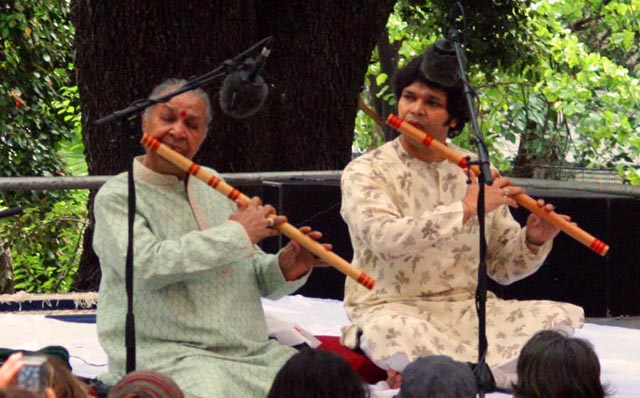
[dropcap]R[/dropcap]akesh Chaurasia is the son of Hari Prasad Chaurasia’s younger brother but grew up in the home of the famous flutist. ” I stayed with him since childhood and started calling him ‘babuji’ and my dad ‘uncle’! 80 percent of the people think I am his son and he introduces me as his child – and I’m proud of that.”
Rakesh recalls that, growing up in the house in Bombay, there was the sound of music all around him since the maestro used to practice throughout the day. “The sound of the flute was in my ears and my mind all the time, and I was really fascinated by it,” he says. ” One day the whole family was sitting and Babuji asked, ‘Does anyone want to play an instrument?’
I was about four and did not even know the name of the instrument but I stood up, as if I was in school, and said, ‘I want to play the instrument you play.’ He went to his room and got me a small flute, and that became my toy and I would play it all the time. “
[dropcap]T[/dropcap]here was music all the time as Panditji performed in film recordings and concerts, and the house was always full of students on Sundays. Says Rakesh, “He was waiting for me to grow up so I could play the same size flute. I performed first when I was six of seven – on a talent show on television. They wanted a small student and Babuji sent me over. When I was ten, I performed the first concert before a live audience- wearing a newly stitched kurta – the fear was there but the good reviews and blessings were there.”
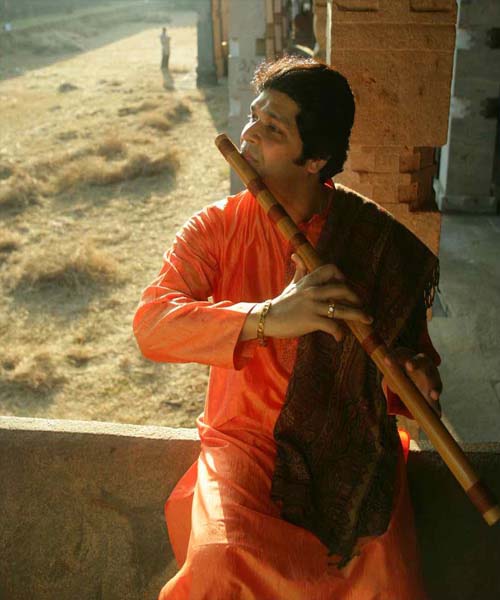
[dropcap]T[/dropcap]hat was the turning point and from a toy and a hobby the bansuri became a serious profession – and a passion. Rakesh recalls that he was recently playing a concert in Nagpur and suddenly the electricity went off. ” I was so involved in my music and the audience kept listening. There was no light in the auditorium, no sound system, no electricity at all. I was told, ‘The power supply is off but don’t worry, when Hariji came, there were cyclones and heavy rains and floods – so it runs in the family!'”
The best thing, says Rakesh Chaurasia, is that in India is you get audiences for all genres of music. So when it’s a classical concert, diehard classical music lovers turn up and they don’t care if there’s no light – if they can hear the music that’s more than enough for them! This enthusiasm and the high expectations of the audience because of his family lineage, keeps him on his toes and practicing.
Performing with Babuji, Rakesh often saw him on stage with the legendary Zakir Husain. Now he himself has been performing solo with the tabla maestro in a series of concerts across the US. He says, “The first time my hands were cold, ice cold – it was my dream and it came true!”
Ask him what is the best gift he’s ever received from Hari Prasad Chaurasia, and Rakesh says, “His instrument. He’s like my Krishna – I’ve never seen Krishna, so for me Hariji is Krishna. I treat him like a God. I’ve not seen the magic of Krishna’s flute – so for me he is Krishna.”
[dropcap]H[/dropcap]e also believes that while the flute is just a folk instrument, Hariji and Shiv Kumar Sharma have taken it to such a level that it can gel with any genre of music, and they are still researching and coming up with new things. The flute is still pure and its sound cannot be reproduced electronically so where the flute is needed they have to call in a flutist.
Rakesh’s 12-year-old son is already playing the flute but his younger one may be more inclined to drums. He recalls that after seeing a concert and lacking drums, the eight-year-old started beating on two balls, a volleyball and a football, mimicking the sizes of the tablas he had seen. It’s all in the family!
(This interview was done in 2012)
Related Article:



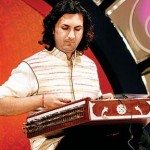
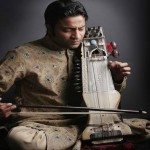
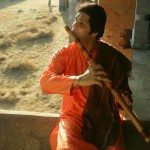
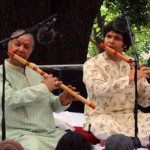

6 Comments
Thanks,Prem. There are so many wonderful stories and I will be sharing these with you as I transcribe them from the audio files.
What joyful news.And what wonderful stories of this rich musical legacy being cherished and strengthened by the next generation. Love the anecdotes especially the one where Indian audiences sit in dim lit auditoriums and listen intently with a passion ..
Simmi, I was intrigued when you told me that the sons of four eminent musicians were going to be performing together. I really enjoyed doing these interviews because they had such intimate tales to tell! I’m sure the concert will be a big success and give music lovers a chance to see the second generation perform.
Thanks, Indu. It is indeed an inspiring story and one of hard work and dedication because in music there are no short cuts and there’s lots of riyaz or practice involved to attain perfection.
Hi Lavina,
I want to thank you for taking the time to interview the artists and then writing such an inspiring article. It is always interesting to know about the musicians’ lives, how they got involved with music, was it their choice of career or was it forced on them. Though the children growing up in such a family do tend to end up choosing music as their career, it’s always intriguing to read about them.
Looking forward to this amazing concert. First time all the four musicians are performing together!
Thanx Lavina for this article.
Hello Lavina
I must congratulate you for writing such an important article on famous artistes and their children. I would have ever known these facts if you had not written this inspiring article.
These children of these noted artistes have proven that hard work, following traditions and dedication can make one successful .
Good to know that in today’s world we have children learning and promoting classical Indian music.
Keep up the good work.